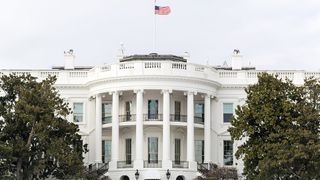Trump Signs Suspect Tech Rip & Replace Bill

The President has signed the Secure and Trusted Communications Act, which the White House pointed out helpfully, "prohibits certain Federal subsidies from being used to purchase communications equipment or services posing national security risks; and establishes a reimbursement program for the replacement of communications equipment of services posing such risks."
Specifically, the law:
1. "Prohibits the Federal Communications Commission (FCC) from subsidizing the acquisition or maintenance of telecommunications equipment or services from untrusted suppliers.
2. "Creates a program to reimburse telecommunications providers with fewer than two million customers. These providers will remove equipment from their networks that poses a national security risk to replace it with equipment from trusted suppliers.
3. "Establishes an information-sharing program for telecommunications providers, particularly small and rural operators."
Related: Competitive Carriers Association Promotes 'Replace & Rip'
In some sense, the law is carrying coals to Newcastle. The FCC already voted unanimously back in November to ban suspect tech from networks, come up with a list of suspect tech--led by Huawei and ZTE--and a framework for compensating carriers for ripping and replacing that technology.
Multichannel Newsletter
The smarter way to stay on top of the multichannel video marketplace. Sign up below.
In fact, the FCC just two weeks ago started collecting input from carriers on just how much of that suspect tech is in their networks to help it come up with that rip and replace framework.
This bill puts a thumb on the scale for that effort and, importantly, a congressional figure for the funds needed for the regime--$1 billion--though it also says the FCC can come back to Congress if that doesn't look like it is going to be enough.
“This new law ratifies the FCC’s recently-adopted initiative to help small, rural telecommunications companies end their reliance on manufacturers that pose national security threats," pointed out FCC chairman Ajit Pai in a statement on the bill signing. "Last November, the FCC initially designated two companies—Huawei and ZTE—as threats to the communications supply chain. We are now considering whether to finalize those preliminary designations while also collecting data about where equipment and services from these two companies are currently deployed. The FCC’s decisive action—along with enactment of this new law—positions us to move forward quickly to protect the American people.
Related: Secure Networks Act Passes Senate
“Now, I hope Congress will build on this success and move forward quickly to appropriate the necessary funding to reimburse carriers for replacing any network equipment or services found to be a national security threat. This funding is essential to successfully transition communications networks—especially those of small and rural carriers—to infrastructure provided by more trusted vendors...."
Pai was hardly along in praising passage.
U.S.-based communications network equipment supplier Mavenir, who wants to be on the "replace" end of that "rip and replace," was one of them. "It is clear now that the United States needs secure, domestic alternatives to power our 4G and 5G networks," said Mavenir CEO Pardeep Kohl. "Mavenir is proud to be a U.S.-headquartered 4G/5G End-to-End Network Software Provider and OpenRAN pioneer that represents one of the United States’ best chances to lead in developing the infrastructure to power the networks of today and tomorrow."
House Energy and Commerce Committee chairman Frank Pallone (D-N.J.), ranking member Greg Walden (R-Ore.), and Reps. Doris Matsui (D-Calif.), and Brett Guthrie (R-Ky.) added some bipartisan love.
“Securing our networks from malicious foreign interference is critical to America’s wireless future, especially as some communications providers rely on equipment from companies like Huawei that pose an immense threat to America’s national and economic security," they said in a joint statement. “With the President signing this important, bipartisan bill into law, we can take steps to protect our communications networks from bad actors, while helping small and rural providers remove and replace suspect network equipment. We look forward to continuing to work together to protect our communications networks, keep Americans safe, and bolster our national security in today's interconnected world."
Contributing editor John Eggerton has been an editor and/or writer on media regulation, legislation and policy for over four decades, including covering the FCC, FTC, Congress, the major media trade associations, and the federal courts. In addition to Multichannel News and Broadcasting + Cable, his work has appeared in Radio World, TV Technology, TV Fax, This Week in Consumer Electronics, Variety and the Encyclopedia Britannica.

